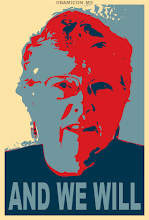One Nation, Under Fire High Country News - February 19, 2007:
Illegal drugs and immigrants pour across an open frontier. The government responds with helicopters and ATVs. And the once-quiet desert homeland of the Tohono O’odham Nation becomes a nerve-wracking police state.
TOHONO O’ODHAM NATION, ARIZONA
A five-strand barbed-wire fence is all that separates the United States and Mexico in this remote southeastern corner of America’s second-largest Indian nation.
On a warm Sunday afternoon in early January, no one from U.S. law enforcement is checking documents as people move back and forth at a crossing — really, just a steel cattle guard in a gap in the fence — known as the San Miguel Gate. There are no signs of Mexican border officials keeping tabs on the gate. Tohono O’odham tribal police are nowhere to be seen.
On this day, in fact, the only suggestion of government control is a Border Patrol officer, posted several hundred yards north of the gate. The officer does not stop a High Country News reporter in a Chevy Suburban (a vehicle prized by the border area’s smugglers) from driving southbound, on the dirt road leading to the gate.
Officially, only members of the Tohono O’odham Nation are allowed to pass through the San Miguel Gate. But no signs warn non-members against crossing. The biggest obstacles to traversing the border at the San Miguel Gate, it seems, are the six-inch gaps between the steel rails of the cattle guard there.
And once you’re in Mexico, the party begins.
Vendors from the northern Sonora towns of Altar, Caborca and Sasabe sell tortillas, white cheese, sodas, water, beer and tequila from the sides of vans and backs of pickup trucks. A Yaqui musician strums his guitar and squeaks out a tune on a harmonica, entertaining six O’odham folks jammed into a sedan, downing quarts of beer and eating tamales.
For decades, O’odham tribal members have used the San Miguel Gate to enter Mexico and shop at the weekend flea market rather than face a lengthy drive to purchase traditional foods (and, for some, liquor, which is not sold on Indian lands) off-reservation. The mood at the bazaar is light-hearted and friendly, at least until an Anglo reporter approaches and tries to strike up a conversation. The vendors are eager to sell their wares, but they are reluctant to talk about what else goes on at the market, particularly when the sun goes down.
“This place is out of control,” says Francisco Bennett, leaning against the side of a pickup truck from which an old man is selling food and beer out of a cooler. Bennett says he’s been coming to the bazaar for years to shop, party and socialize with his O’odham friends, who live on both sides of the border. Years ago, he says, families with young children would gather for the day and stay well into the evening.
But those relaxed weekends are long gone.
[Continue the story at High Country News using the link on the title.]


Links to this post:
Create a Link
<< Home